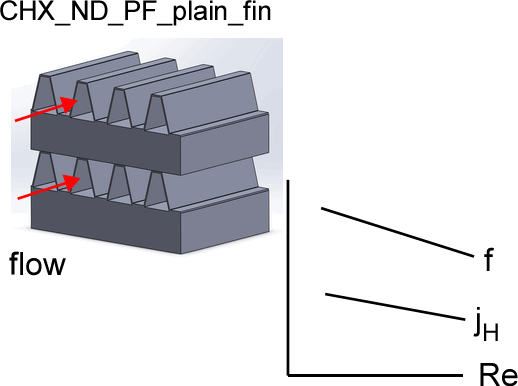
PF plain-fin ND functions

The procedure:
CHX_ND_PF_plain_fin(TypeHX$, Re: f, j_H)
provides the dimensionless performance associated with a pin fin compact heat exchanger surface. These data are from Kays and London (1994).
Inputs
TypeHX$: string identifying the geometry
2.0: 'PF_plain-fin_20'
3.01: 'PF_plain-fin_301'
3.97: 'PF_plain-fin_397'
5.3: 'PF_plain-fin_53'
6.2: 'PF_plain-fin_62'
9.03: 'PF_plain-fin_903'
11.11: 'PF_plain-fin_1111'
11.11a: 'PF_plain-fin_1111a'
14.77: 'PF_plain-fin_1477'
15.08: 'PF_plain-fin_1508'
19.86: 'PF_plain-fin_1986'
10.27T: 'PF_plain-fin_1027T'
11.94T: 'PF_plain-fin_1194T'
12.00T: 'PF_plain-fin_1200T'
16.96T: 'PF_plain-fin_1696T'
25.79T: 'PF_plain-fin_2579T'
30.33T: 'PF_plain-fin_3033T'
46.45T: 'PF_plain-fin_4645T'
Re: Reynolds number (-)
Outputs
f: friction factor (-)
j_H: Colburn j function for heat transfer (-)
The Reynolds number is defined according to:

where m is the viscosity, Dh is the hydraulic diameter, and G is the mass flux. The hydraulic diameter is defined as:

where Ac is the minimum free flow area, A is the total heat transfer area, and L is the length in the flow direction.
The mass flux is defined as:

where 
The friction factor is defined as:

where r is the density, and to is the equivalent shear stress, defined as:

where DP is the pressure drop due to friction and form drag in the core.
Example
TypeHX$= 'PF_plain-fin_4645T'
Re=2650
Call CHX_ND_PF_plain_fin(TypeHX$, Re: f, j_H)
{Solution is:
f = 0.1084, j_H = 0.0031}
Related procedures include: